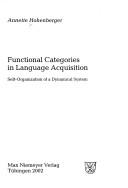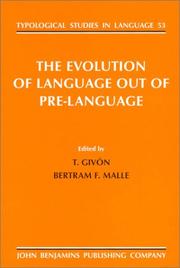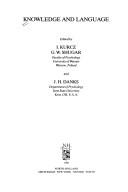| Listing 1 - 8 of 8 |
Sort by
|

ISBN: 9027219214 1588113736 9786612161285 1282161288 902729657X 9789027296573 9789027219213 9781588113733 9781282161283 6612161280 Year: 2003 Volume: 1 Publisher: Amsterdam Benjamins
Abstract | Keywords | Export | Availability | Bookmark
 Loading...
Loading...Choose an application
- Reference Manager
- EndNote
- RefWorks (Direct export to RefWorks)
The focus of this collection of essays is on the acquisition of so called vulnerable and invulnerable grammatical domains in multilingualism. Language acquisition is studied from a comparative perspective, mostly in the framework of generative grammar. Different types of multilingualism are compared, the existence of multiple grammars in L1 acquisition, simultaneous L2 acquisition (balanced and unbalanced bilingualism) and successive L2 acquisition (child and adult L2 acquisition). Evidence from the language pairs French-German, Italian-Swedish, Spanish-English, Spanish-German, Spanish-Basque, Portuguese-Japanese-English, Portuguese-German, English-German, Turkish-German is brought to bear on grammatical issues pertaining to the morphology and syntax of the noun phrase, pronoun use and the null-subject property, clause structure, verb position, non-finite clauses, agreement at the clause level, and on issues like code mixing and language dominance.
Sociolinguistics --- Bilingualism in children. --- Acquisition du langage --- Acquisition of language --- Bilingualism in children --- Bilinguisme -- Chez l'enfant --- Bilinguisme chez l'enfant --- Bilinguisme chez les enfants --- Enfants -- Bilinguisme --- Enfants bilingues --- Langage [Acquisition du ] --- Language acquisition --- Language development in children --- Taalverwerving --- Tweetaligheid bij kinderen --- Languages & Literatures --- Philology & Linguistics --- Developmental linguistics --- Developmental psycholinguistics --- Language and languages --- Psycholinguistics, Developmental --- Interpersonal communication in children --- Psycholinguistics --- Children --- Acquisition --- Language acquisition.

ISBN: 9027241376 1588114120 9786612161162 1282161164 902729643X 9789027241375 9781588114129 9789027296436 9781282161160 6612161167 Year: 2003 Volume: v. 26 Publisher: Amsterdam Philadelphia John Benjamins
Abstract | Keywords | Export | Availability | Bookmark
 Loading...
Loading...Choose an application
- Reference Manager
- EndNote
- RefWorks (Direct export to RefWorks)
The papers in this volume focus on the impact of information structure on language acquisition, thereby taking different linguistic approaches into account. They start from an empirical point of view, and examine data from natural first and second language acquisition, which cover a wide range of varieties, from early learner language to native speaker production and from gesture to Creole prototypes. The central theme is the interplay between principles of information structure and linguistic structure and its impact on the functioning and development of the learner's system. The papers examine language-internal explanatory factors and in particular the communicative and structural forces that push and shape the acquisition process, and its outcome. On the theoretical level, the approach adopted appeals both to formal and communicative constraints on a learner's language in use. Two empirical domains provide a 'testing ground' for the respective weight of grammatical versus functional determinants in the acquisition process: (1) the expression of finiteness and scope relations at the utterance level and (2) the expression of anaphoric relations at the discourse level.
Language acquisition --- Scope (Linguistics) --- Anaphora (Linguistics) --- Anaphora (Linguistics). --- Scope (Linguistics). --- Acquisition du langage --- Acquisition of language --- Anafoor (Taalwetenschap) --- Anaphore (Linguistique) --- Bereik (Taalwetenschap) --- Langage [Acquisition du ] --- Language development in children --- Portée (Linguistique) --- Taalverwerving --- Philology & Linguistics --- Languages & Literatures --- Cross-reference (Linguistics) --- Grammar, Comparative and general --- Linguistics --- Reference (Linguistics) --- Interpersonal communication in children --- Psycholinguistics --- Language acquisition.

ISBN: 3484304561 3110923521 9783110923520 9783484304567 Year: 2011 Volume: 456 Publisher: Tübingen
Abstract | Keywords | Export | Availability | Bookmark
 Loading...
Loading...Choose an application
- Reference Manager
- EndNote
- RefWorks (Direct export to RefWorks)
This study investigates the acquisition of Functional Categories (e.g., INFL (AGR, TNS), DET, COMP) from the perspective of self-organization in generative grammar. Language is conceived of as a dynamical system which evolves in time and bifurcates when critical thresholds are reached. The emergence of syntax as evidenced by the acquisition of Functional Categories is the major bifurcation in child language acquisition. Target values of syntactic parameters are attractors which children approach on individual trajectories. A proposed tripartite scenario of change - from a simple stable state A, via symmetry-breaking in a liminal phase B characterized by variation, to a new complex stable state C - accounts for the dynamics in early grammatical development. Traditional generative issues, such as the acquisition of case-marking, finiteness, V2, and wh-questions, are discussed as well as new issues, such as functional neologisms, and sentential blends. Dynamical notions like precursor, oscillation, symmetry-breaking, and trigger are important explanatory tools. The growing child phrase marker is a fractal mental object which represents syntactic information by way of self-similar extended projections. The book addresses researchers in language acquisition from various theoretical camps: generative, functional, connectionist, by giving new answers to old questions in the light of a novel challenging theory: self-organization.
Acquisition du langage --- Acquisition of language --- Auto-organisation (Théorie des systèmes) --- Fonctionalisme (Linguistique) --- Functionalism (Linguistics) --- Functionalisme (Taalwetenschap) --- Langage [Acquisition du ] --- Language acquisition --- Language development in children --- Learning systems (Automatic control) --- Self-optimizing systems --- Self-organizing systems --- Systèmes auto-optimalisants --- Systèmes auto-organisés --- Systèmes d'apprentissage (Commande automatique) --- Taalverwerving --- Zelfregelende systemen --- Language acquisition. --- Grammar, Comparative and general --- Language and languages --- Syntax --- Developmental linguistics --- Developmental psycholinguistics --- Psycholinguistics, Developmental --- Interpersonal communication in children --- Psycholinguistics --- Syntax. --- Acquisition --- Linguistics --- Philology --- Grammar, Comparative and general Syntax
Book
ISBN: 3110111861 3110854198 Year: 1987 Volume: 49 Publisher: Berlin
Abstract | Keywords | Export | Availability | Bookmark
 Loading...
Loading...Choose an application
- Reference Manager
- EndNote
- RefWorks (Direct export to RefWorks)
No detailed description available for "The Acquisition of Narratives".
Cognitive psychology --- Psycholinguistics --- Developmental psychology --- Betoog [Taalfilosofie]. --- Langage. Acquisition. --- Discours [Philosophie du langage]. --- Taal. Aanleren. --- Language Development. --- Development, Language --- Developments, Language --- Language Developments --- Language Acquisition --- Acquisition, Language --- Language Development --- Language acquisition. --- Discourse analysis, Narrative. --- Cohesion (Linguistics) --- Coherence (Linguistics) --- Cohesiveness (Linguistics) --- Discourse analysis --- Linguistics --- Narrative discourse analysis --- Narration (Rhetoric) --- Acquisition of language --- Developmental linguistics --- Developmental psycholinguistics --- Language and languages --- Language development in children --- Psycholinguistics, Developmental --- Interpersonal communication in children --- Acquisition

ISBN: 9027229597 1588112373 9027229600 1588112381 9786612160868 1282160869 9027296081 9789027296085 9781588112378 9781588112385 9781282160866 6612160861 Year: 2002 Volume: 53 Publisher: Amsterdam Benjamins
Abstract | Keywords | Export | Availability | Bookmark
 Loading...
Loading...Choose an application
- Reference Manager
- EndNote
- RefWorks (Direct export to RefWorks)
The contributors to this volume are linguists, psychologists, neuroscientists, primatologists, and anthropologists who share the assumption that language, just as mind and brain, are products of biological evolution. The rise of human language is not viewed as a serendipitous mutation that gave birth to a unique linguistic organ, but as a gradual, adaptive extension of pre-existing mental capacities and brain structures. The contributors carefully study brain mechanisms, diachronic change, language acquisition, and the parallels between cognitive and linguistic structures to weave a web of hypotheses and suggestive empirical findings on the origins of language and the connections of language to other human capacities. The chapters discuss brain pathways that support linguistic processing; origins of specific linguistic features in temporal and hierarchical structures of the mind; the possible co-evolution of language and the reasoning about mental states; and the aspects of language learning that may serve as models of evolutionary change.
Psycholinguistics --- Acquisition du langage --- Acquisition of language --- Evolutie [Menselijke ] --- Evolution humaine --- Homme--Evolution --- Human evolution --- Langage [Acquisition du ] --- Language acquisition --- Language development in children --- Mens--Evolutie --- Menselijke evolutie --- Taalverwerving --- 800:159.9 --- 800:159.9 Taalwetenschap. Taalkunde. Linguistiek-:-Psychologie: zie ook: Psychiatrie: n-{616.89-008} en n-{615.851} --- Taalwetenschap. Taalkunde. Linguistiek-:-Psychologie: zie ook: Psychiatrie: n-{616.89-008} en n-{615.851} --- Language and languages --- Origin --- Philology & Linguistics --- Languages & Literatures --- Human evolution. --- Language acquisition. --- Interpersonal communication in children --- Evolution (Biology) --- Physical anthropology --- Evolutionary psychology --- Human beings --- Origin of languages --- Speech --- Origin.

ISBN: 0262581809 026208242X 0262275465 0585331480 9780585331485 9780262275460 9780262581806 9780262082426 Year: 1996 Publisher: Cambridge, Mass. MIT
Abstract | Keywords | Export | Availability | Bookmark
 Loading...
Loading...Choose an application
- Reference Manager
- EndNote
- RefWorks (Direct export to RefWorks)
Annotation
Language acquisition --- Comprehension in children --- Grammar, Comparative and general --- Langage --- Compréhension chez l'enfant --- Syntaxe --- Syntax --- Acquisition --- Acquisition du langage --- Acquisition of language --- Begrijpen bij kinderen --- Bevattingsvermogen bij kinderen --- Compréhension chez les enfants --- Langage [Acquisition du ] --- Language development in children --- Taalverwerving --- Philology & Linguistics --- Developmental linguistics --- Developmental psycholinguistics --- Psycholinguistics, Developmental --- Languages & Literatures --- Child psychology --- Comparative grammar --- Grammar --- Grammar, Philosophical --- Grammar, Universal --- Language and languages --- Philosophical grammar --- Linguistics --- Philology --- Interpersonal communication in children --- Psycholinguistics --- Grammar, Comparative --- Grammar [Comparative and general ] --- Comprehension in children. --- Language acquisition. --- Syntax. --- Language --- Learning --- By --- Children --- Grammar, Comparative and general Syntax

ISBN: 1588114554 9027252912 9786612255274 1423772369 9027295778 1282255274 9789027295774 9781423772361 9781588114556 9789027252913 6612255277 9781282255272 Year: 2004 Publisher: Amsterdam Benjamins
Abstract | Keywords | Export | Availability | Bookmark
 Loading...
Loading...Choose an application
- Reference Manager
- EndNote
- RefWorks (Direct export to RefWorks)
This volume is a collection of studies by some of the foremost researchers of French acquisition in the generative framework. It provides a unique perspective on cross-learner comparative research in that each chapter examines the development of one component of the grammar (functional categories) across different contexts in French learners: i.e. first language acquisition, second language acquisition, bilingual first language acquisition and specifically-language impaired acquisition. This permits readers to see how similar issues and morphosyntactic properties can be investigated in a range of various acquisition situations, and in turn, how each context can contribute to our general understanding of how these morphosyntactic properties are acquired in all learners of the same language. This state-of-the-art collection is enhanced by an introductory chapter that provides background on current formal generative theory, as well as a summary and synthesis of the major trends emerging from the individual studies regarding the acquisition of different functional categories across different learner contexts in French.
Psycholinguistics --- French language --- Bilingualism in children. --- Specific language impairment in children. --- Acquisition. --- Language acquisition. --- SLI (Specific language impairment) in children --- Specific language disability in children --- Language disorders in children --- Children --- Interpersonal communication in children --- Langage / Acquisition --- Français (Langue) / Acquisition --- Bilinguisme chez l'enfant --- Audimutité --- REFERENCE. --- LANGUAGE ARTS & DISCIPLINES / Alphabets & Writing Systems --- FOREIGN LANGUAGE STUDY. --- LANGUAGE ARTS & DISCIPLINES / Linguistics / General --- LANGUAGE ARTS & DISCIPLINES / Grammar & Punctuation --- LANGUAGE ARTS & DISCIPLINES. --- LANGUAGE ARTS & DISCIPLINES / Spelling --- Bilingualism in children --- French language / Acquisition --- Language acquisition --- Specific language impairment in children --- Taalverwerving --- Frans --- Französisch --- Linguistik --- Acquisition

ISBN: 0444700668 9780080866932 008086693X 9780444700667 1282617826 9781282617827 9786612617829 6612617829 Year: 1986 Volume: 39 Publisher: Amsterdam ; New York : New York, N.Y. : North-Holland ; Sole distributors for the U.S.A. and Canada, Elsevier Science Pub. Co.,
Abstract | Keywords | Export | Availability | Bookmark
 Loading...
Loading...Choose an application
- Reference Manager
- EndNote
- RefWorks (Direct export to RefWorks)
How do people represent their knowledge about the world and use that knowledge for communication? This question is the central theme of this book. Among the aspects discussed in the first three sections are: the relationship between formal, logical descriptions of language, and psychological analyses of language use; how knowledge interacts with language use; and childrens' acquisition of language in different countries. In the last two sections, the topics discussed include the complex relationships between the development, transmission, and comprehension of intention and meaning
Cognitive psychology --- Lexicology. Semantics --- Psycholinguistics --- Language acquisition --- Cognition --- Psycholinguistique --- Langage --- Congresses --- Congrès --- Acquisition --- Psycholinguistique. --- Cognition. --- Psycholinguistics. --- Language acquisition. --- Psychology --- Acquisition of language --- Developmental linguistics --- Developmental psycholinguistics --- Language and languages --- Language development in children --- Psycholinguistics, Developmental --- Interpersonal communication in children --- Language, Psychology of --- Psychology of language --- Speech --- Linguistics --- Thought and thinking --- Connaissance --- Cinéma --- Philosophie de l'esprit --- Dieu --- Thérapie cognitive --- Théorie de la connaissance --- Psychologie cognitive --- Sciences cognitives --- Distracteurs (psychologie) --- Cognition distribuée --- Énaction --- Écriture --- Lecture --- Pensée --- Attention --- Savoir-faire --- Fonctions exécutives (neuropsychologie) --- Abstraction --- Catégorisation (psychologie) --- Cognition et culture --- Compréhension --- Conservation (psychologie) --- Dissonance cognitive --- Traitement de l'information chez l'homme --- Nombre, Idée de --- Perception --- Perception des structures --- Styles cognitifs --- Cartes cognitives --- Schèmes (psychologie) --- Métacognition --- Constructivisme (psychologie) --- Intuition --- Psychologie --- Apprentissage verbal --- Enfants --- Langue maternelle, Acquisition de la --- (linguistique) --- Langues --- Parole --- Psychologie du langage --- Biolinguistique --- Neurolinguistique --- Psychanalyse et langage --- Attitudes linguistiques --- Compétence de communication (linguistique) --- Compétence et performance (linguistique) --- Conscience linguistique --- Contrôle (linguistique) --- Créativité (linguistique) --- Différenciateur sémantique --- Discours intérieur --- Langage et émotions --- Linguistique cognitive --- Perception de la parole --- Psychophonétique --- Saillance linguistique --- Son --- Tabous linguistiques --- Tests linguistiques --- Troubles du langage --- Linguistique --- Acquisition. --- Psychological aspects --- Aspect cognitif --- Cognoscibilité --- Tests --- Langage -- Acquisition --- Apprentissage --- Aspect psychologique --- Différences entre sexes --- Aspect symbolique --- Acquisition linguistique --- Innéisme (linguistique) --- Reconnaissance des mots --- Psychologie de l'apprentissage --- Language Development --- Psycholinguistic --- Language Acquisition --- Acquisition, Language --- Development, Language --- Cognitive Function --- Cognitions --- Cognitive Functions --- Function, Cognitive --- Functions, Cognitive --- Submorphologie --- Sériation (psychologie) --- Prospection épisodique --- Traitement de l'information (psychologie) --- Amorçage syntaxique --- Acquisition du langage --- Psychologie de la lecture
| Listing 1 - 8 of 8 |
Sort by
|

 Search
Search Feedback
Feedback About UniCat
About UniCat  Help
Help News
News